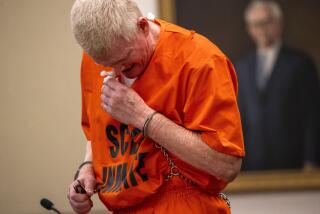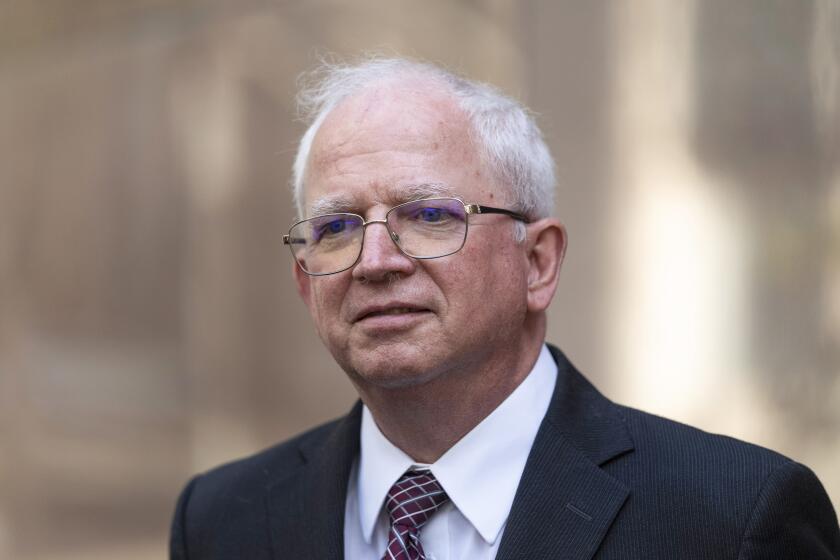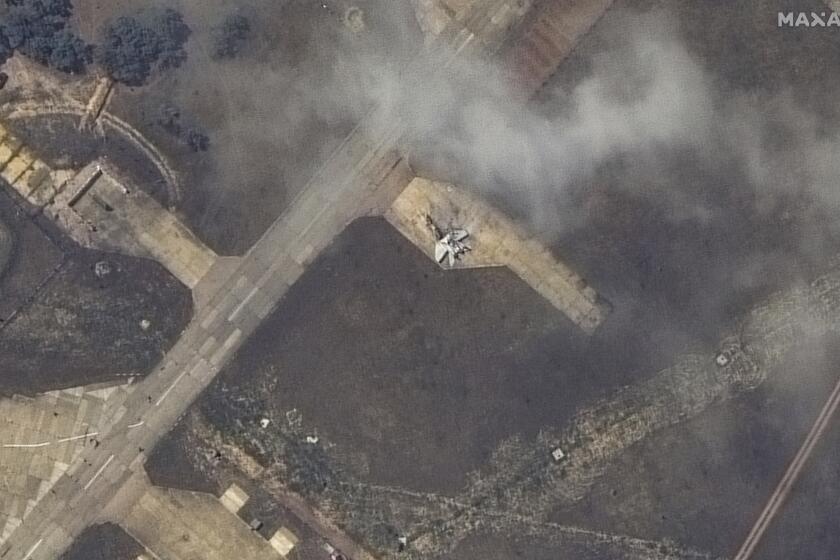3 Macedonian Soldiers Killed in Clashes With Guerrillas
Three Macedonian soldiers were killed as fighting with ethnic Albanian guerrillas raged near the Kosovo border Sunday, and the violence triggered a shift in U.S. policy to support for tougher Macedonian military action against the insurgents.
“We understand the need and obligation of Macedonia to respond to this kind of threat,” U.S. Ambassador to Macedonia M. Michael Einik told reporters in Skopje, the capital. “This response should be appropriate to the situation on the ground and should be done in coordination with NATO. American officials are engaged in sub-coordination as we speak.”
Macedonian Foreign Minister Sergan Kerim called for an emergency session of the U.N. Security Council to address the crisis.
Macedonian security forces and the NATO-led peacekeeping force in Kosovo will “take coordinated action to bring the critical area under control and to normalize the situation at the border zone,” Kerim said late Sunday. “Such measures will be taken within the next hours. . . . [But] Macedonia is far from a state of war, and the situation should not be dramatized.” Only Thursday, the North Atlantic Treaty Organization had urged Skopje to seek a political rather than military solution to the conflict in the strategically sensitive border area, so as to avoid destabilizing relations between the country’s majority Macedonians and minority ethnic Albanians.
The fighting appears related to a battle by ethnic Albanian guerrillas for control of the nearby Presevo Valley in southern Serbia. In recent months, the NATO-led KFOR peacekeeping force in Kosovo--a province of Serbia, the dominant Yugoslav republic--has stepped up its efforts to police the border between Kosovo and that conflict area. Tanusevci is on a route that has recently been used to smuggle guns from Macedonia directly into the Presevo region without going through Kosovo, Belgrade’s B-92 Radio said Sunday.
KFOR officials were clearly angered and worried by Sunday’s incidents. Two of the Macedonian soldiers were killed--and a comrade seriously wounded--when their vehicle hit a mine on the road leading from Skopje to the guerrilla-controlled village of Tanusevci, a KFOR spokesman said. The third soldier killed was hit by sniper fire in an area closer to the village, according to Macedonian authorities.
Armed ethnic Albanians have held the village for the last 17 days.
One of the soldiers killed by the mine died only after a U.S. medical helicopter based in Macedonia failed in two attempts to reach and evacuate him, KFOR spokesman Richard Heffer said. KFOR provided no immediate information on why the rescue attempt failed, but the Skopje correspondent for B-92 Radio reported that it was because the helicopter had been fired upon.
There was also shooting Sunday against Macedonian soldiers from the area of two villages on the Kosovo side of the border, the Macedonian Defense Ministry said.
KFOR on Sunday further beefed up its troop presence and aerial surveillance activities in Kosovo directly across the border from Tanusevci, Heffer said.
If KFOR finds itself forced to take tough action against the insurgents, that could sour its relations with the ethnic Albanians who now make up 95% of Kosovo, which has been under U.N. administration since NATO’s 11-week air war against Yugoslavia two years ago to end the lethal repression of the population by Serbian and Yugoslav forces.
In a statement of condolence to the families of the soldiers killed Sunday, Brig. Gen. Kenneth Quinlan, the commander of Task Force Falcon, the U.S. troop contingent in that sector of Kosovo, declared that “this senseless violence serves no purpose.” Peacekeepers are “taking the necessary steps to prevent this violence from spilling over into Kosovo” and are informing Macedonian authorities of activities along the border, he said.
Macedonia also announced that it had closed its Kosovo border crossings to all ordinary traffic in order to tighten security in the area. KFOR said it had set up its own temporary checkpoints inside Kosovo on roads leading to those crossings to inform travelers of the closures.
“If they want to close their border crossings, they’re obviously entitled to do that,” Heffer said.
Hamdi Hasani, mayor of the Kosovo village of Debelde, just across the border from Tanusevci, told reporters that his community was bracing for a new flood of refugees. Hundreds of villagers have fled into Kosovo from Macedonia as fighting has intensified over the last two weeks.
Two U.S. Apache helicopters and a pilotless reconnaissance plane could be seen flying on the Kosovo side of the border near Debelde on Sunday.
“KFOR will intensify surveillance of the border in close cooperation with Macedonian forces,” KFOR commander Carlo Cabigiosu of Italy told reporters after talks with top Macedonian officials in Skopje.
KFOR and Macedonian officials met late Sunday to plan coordinated action in the Tanusevci area, according to reports from Skopje.
The Organization for Security and Cooperation in Europe also threw its full support behind Skopje.
“After today’s turn of events, we will understand and support a reasonable military response by the army and police to try to control the situation,” OSCE Ambassador to Macedonia Carlo Ungaro said.
NATO announced last week that in order to deny a haven to the guerrillas in the Presevo Valley, it planned to reduce a buffer zone that keeps Serbian forces away from the Kosovo border in southern Serbia. The reduction would be conditioned on whether the government in Belgrade, the capital of both Serbia and Yugoslavia, grants greater political rights to the primarily ethnic Albanian population of that area, NATO officials said.
Yugoslav President Vojislav Kostunica sent a telegram of condolence to Macedonian President Boris Trajkovski and the people of Macedonia on Sunday in which he declared, “I hope that the international community, which has undertaken the obligation to maintain peace and security [in the Kosovo region], will finally start to fulfill that obligation.”
More to Read
Start your day right
Sign up for Essential California for news, features and recommendations from the L.A. Times and beyond in your inbox six days a week.
You may occasionally receive promotional content from the Los Angeles Times.






